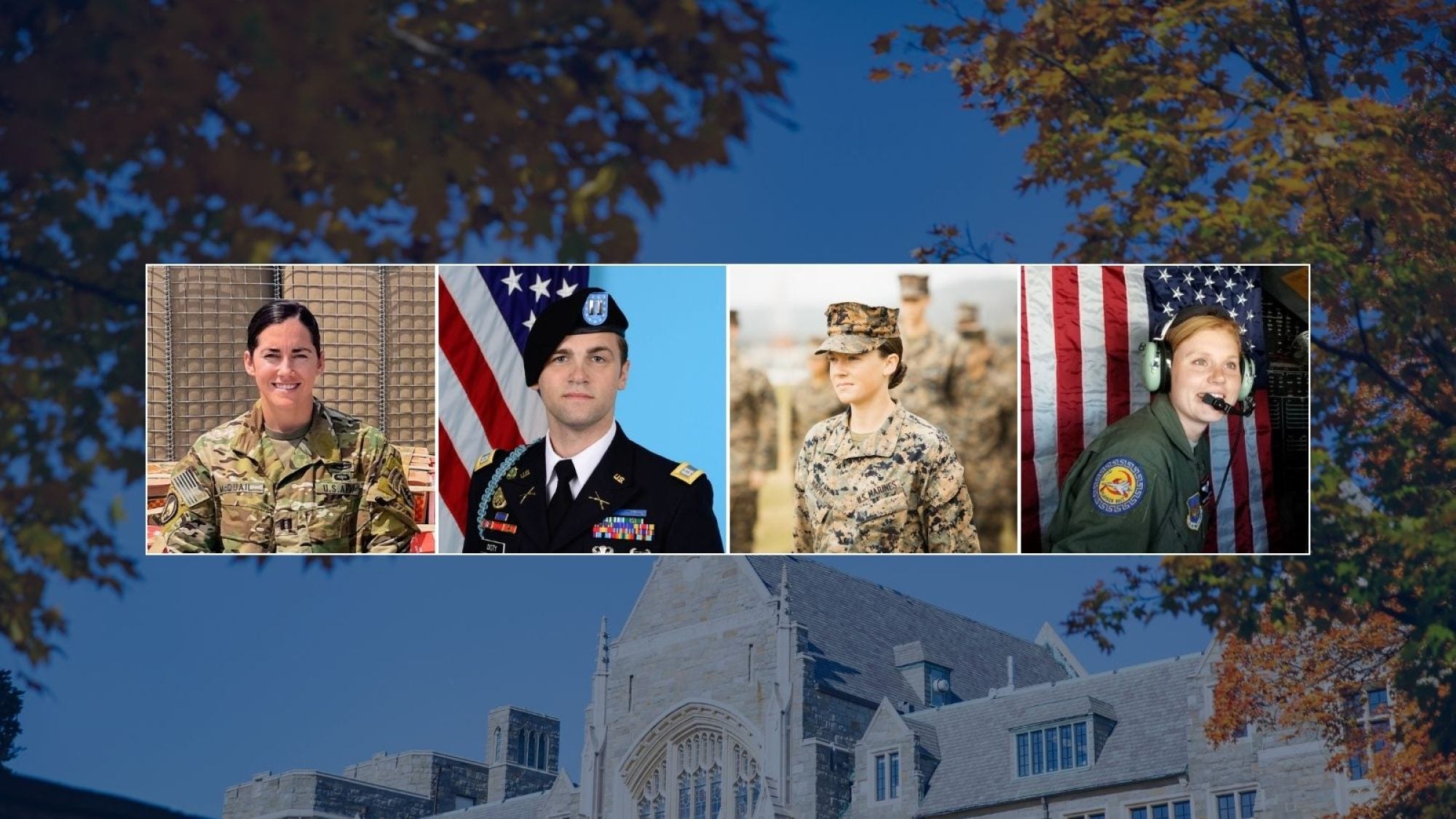Each year on November 11, the United States honors its military veterans for their service and sacrifice to our country for the common good. The Hilltop is home to more than 1,200 military-connected students, including service members, veterans and military families, and Georgetown provides robust support for these students in their pursuit of higher education and careers in foreign service.
The School of Foreign Service is proud to recognize and celebrate the contributions of some of our own student veterans. They share with us stories from active duty as well as the journeys that led them to Georgetown.
Putting Experiences into Practice
For Olivia McQuail (SSP’26), 31, the military was always a family tradition. Both of her grandfathers, her father and her brothers have all served in the U.S. Army. Born in Monterey, California, McQuail grew up moving around bases and knew she wanted to experience military life for herself. While an undergraduate studying public health at American University, she participated in the Hoya Battalion, Georgetown’s Reserve Officers’ Training Corps (ROTC) program.
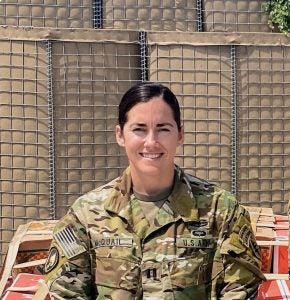
McQuail was officially commissioned into the U.S. Army at 21 years old, starting as a field artillery officer at Fort Carson, Colorado, and later becoming a civil affairs officer at Fort Liberty, North Carolina. These postings fostered both her love of nature and her leadership skills.
A civil affairs assignment in Somalia first exposed McQuail to careers outside of the military. Working closely with the U.S. embassy and political-military officers, she realized that these pathways were more aligned with what she ultimately wanted to do.
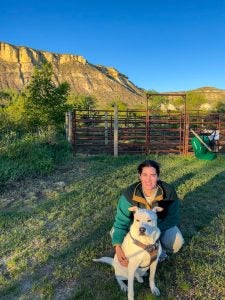
After serving on active duty for nine years, McQuail made her way back to DC—and back to Georgetown—to join the M.A. in Security Studies Program. Though she admits to being initially intimidated about coming to academia, she now feels more confident in her ability to approach her faculty and take advantage of the resources available to her, such as the university’s Military and Veterans’ Resource Center.
“This is a privilege that I get to be here. This is for me to make the most of, so I get to be a much better and more attentive student this time around,” she says.
McQuail looks forward to building upon her civil affairs experiences while in the program, including maintaining her French language skills. She also wants to focus her future coursework on West Africa and African security issues.
“In the military, I had a lot of experiences that broadened my worldview, but I never felt like I had enough of the academic background to be fully confident in some of the things that I was implementing,” she said. “I think it’s helpful for me here to learn the theory and the academics that go behind the decisions that are being made. It also puts a lot of my experiences into perspective.”
A Passion for Public Service
Greg Doty (MAERES’26), 31, first had the idea of joining the military when he was around 10 years old, but it was not until he reached high school that he started taking it seriously. He was not the best student and knew he needed to make a big change in his life.
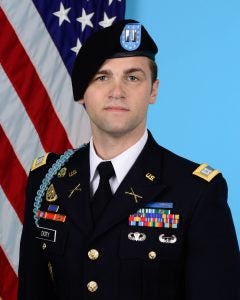
Originally from the Hudson Valley in New York, Doty attended Pace University for his undergraduate studies and participated in Fordham University’s ROTC, a program he says helped foster discipline and focus while living in New York City. These attributes paid off when he was selected as an active duty infantry officer in the U.S. Army.
He quickly found that his unique academic linguistic background in Russian and Polish opened doors to interesting leadership assignments in Europe, including serving as a U.S. staff officer in a Polish brigade for six months. He was also sent to Georgia as a staff attachment and later had the opportunity to be an adjutant to the commander of the second Cavalry Regiment in Germany. He was on the ground during the onset of the COVID-19 pandemic as well as the Russian invasion of Ukraine.
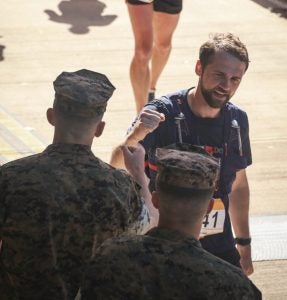
“I got to be on the front lines of every major crisis going on in Europe from 2020 all the way up until 2022,” he says.
One of Doty’s career-defining assignments came when he worked as a military attachment to the U.S. State Department in Erbil, Iraq. Working day-to-day with foreign service officers cemented his decision to pursue this path through higher education. Georgetown, he says, was the natural choice, and now he is in his first year of the Master of Arts in Eurasian, Russian and East European Studies (MAERES) program.
Having served for 11 years—six of which overseas, a majority of his adult life—Doty continues to navigate challenges with adjusting that part of his personality to civilian life, but is greatly motivated by his passion for public service.
“The military has given me this love and appreciation for anyone who takes public service seriously, the value of giving back to your community and trying to give back more than you take,” he says. “Georgetown provides a lot of opportunities for you to really make a difference.”
Exposure to Ideas and Opportunities
Stephanie Murphy (MAERES’26), 29, was drawn to the military for three things: adventure, service and challenge. Looking to experience something outside of her small hometown of Lawrenceville, Georgia, she set out to the Naval Academy for her undergraduate studies. Murphy was commissioned into the U.S. Marine Corps right after graduation and served for five years.
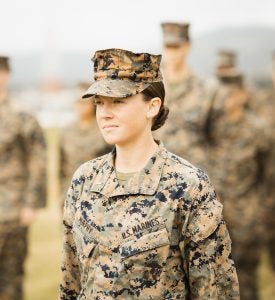
While on active duty, she was stationed in Okinawa, Japan, for three years during the pandemic, followed by a six-month assignment in the Philippines as a public affairs liaison between the military and the embassy. After her service ended, Murphy was not quite ready to return to civilian life, and she was fortunate to travel to Kazakhstan as a 2023-2024 Fulbright Scholar.
While navigating the culture shock of coming back to the United States from Asia, and equipped with an undergraduate background in Russian, Murphy was drawn to the MAERES program not only for its regional focus, but also the opportunity to reimagine her connection to service.
“The military drove me to Georgetown in a way because I became interested in doing some other type of service, something more diplomatic, something more humanitarian-focused,” she says. “And I think Georgetown’s a really good way to break into a new sphere.”
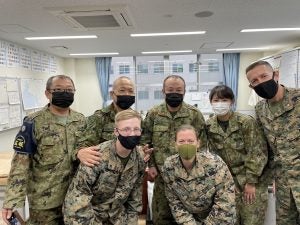
As she continues through her first year of the program, Murphy looks forward to having exposure to different ideas and pathways. At the moment, however, she is interested in the field of international development, potentially working for an NGO or the U.S. State Department. At the end of the day, she strongly believes that her decision to pursue a graduate degree, though daunting, has introduced her to opportunities she would not have found elsewhere after her service.
“If anyone is interested in higher education after the military, I think it’s actually a really great way to transition,” she says. “I probably should have thought about it sooner.”
Building New Communities
Veteran. Graduate student. Mother. Chelsea Hollenback (MSFS’26), 31, does it all. Having been raised in southern Virginia, Hollenback says relocating back to Virginia for school with her two kids and husband, who is also in the military, felt like coming home.
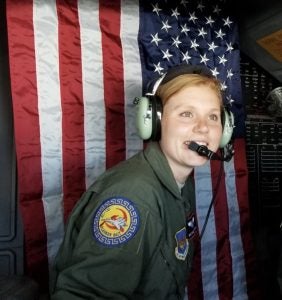
Despite being surrounded by family members who had served in the military, Hollenback did not consider this path for herself growing up. Yet, when she arrived for her first year of undergraduate studies, she knew she was not where she wanted to be and found herself investigating other avenues of life. She was particularly struck by a female Air Force pilot in her biology class, and for the first time, Chelsea could see herself in the military.
She went on to serve on active duty in the U.S. Air Force for nine and a half years. During this time, she was stationed twice at the Defense Language Institute—one of her favorite places in the world—working as a Hebrew linguist and a Chinese linguist on separate assignments. Hollenback shares how her instructors were fundamental in shaping her worldview, including a guest lecturer who she later learned was a Uyghur, at a time when the Uyghur internment camps in China had just come to light.
Though she initially discovered Georgetown’s Master of Science in Foreign Service (MSFS) program after casually researching international relations graduate programs, the puzzle pieces fell into place in 2022 when Hollenback attended the Joint Women’s Leadership Symposium, featuring a panel with an MSFS student and representation from the Georgetown Institute for Women, Peace and Security.
“It just felt like a little nudge, and so after that, I started looking more seriously, and from then on, Georgetown was the goal. It just felt like that was the right place for me,” she says.
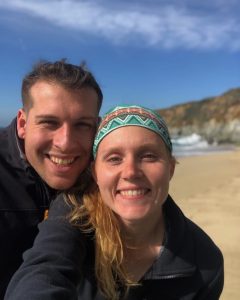
Now in her first year of the program, Hollenback emphasizes that the hardest part of her civilian transition is leaving the military community behind. Thankfully, she says, MSFS has been really intentional about creating new support networks. She has not only connected with other veterans, but other mothers in the program as well. Hollenback is an active member of the “Parents Group Chat” and has even participated in a play group with the children of her classmates.
This support has fueled her academic pursuits. Her concentration within the program is in global politics and security, and she is currently building her coursework around international human rights. In fact, she plans on applying to the MSFS’ dual degree program with Georgetown Law so that she may also obtain a Juris Doctorate. This, she believes, would be the perfect marriage of her passions for diplomacy, law and global service.
“This idea of service to your community has become embedded in who I am,” she says. “Choosing this program was a very deliberate choice. How can I continue to serve my community? I just am now broadening it to the international community.”
